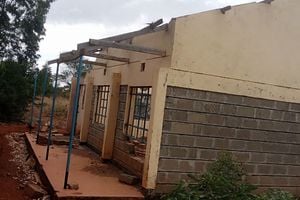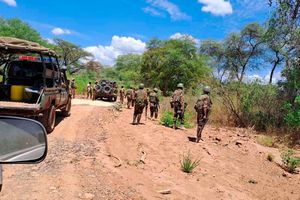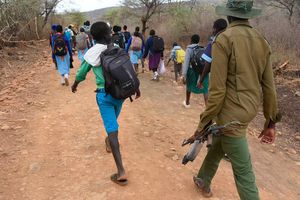
Members of the public view a bullet-riddled school bus belonging to Mogil Secondary School in Marakwet East, Elgeyo-Marakwet County, on February 18, 2022.
On June 7, 2022, a video of Grade 3 learners at Tot Primary School in Kerio Valley, Elgeyo-Marakwet County, reciting a poem mourning three classmates shot dead by bandits, went viral on social media.
Through the emotional ode, just a few metres from where the caskets of their dead classmates lay during a funeral at the school, the children appealed to then-President Uhuru Kenyatta to restore sanity in the troubled area by stopping the spate of killings by bandits.
“Haki zetu twahitaji katika bonde hili. Uhuru uko wapi tukiuawa kinyama? (We need our right in this valley. Where are you Uhuru as we are brutally killed ?)” recited the pupils.
It was on a Sunday afternoon, May 29, 2022. The three young boys aged between nine and 11 and their peers were enjoying mangoes near Tot shopping centre while playing a few metres from some herders when all hell broke loose.
Gunshots rent the air as armed criminals shot at people indiscriminately. The lives of the three boys and a herder were cut short after they were sprayed with bullets by the criminals who were undeterred by screams of fleeing residents.
When the guns fell silent, six others had sustained injuries. The bandits had also driven away an unknown number of livestock as they crossed the Kerio River towards Tiaty, but they were fought by security officers who recovered the animals.
Three months before the incident, a driver of a school bus was shot dead and over 15 learners and their teachers sustained gunshot injuries after they were attacked by armed criminals on the Arror-Tot road.
The learners and teachers from Tot High School, who were in a convoy of three buses, were from an academic tour in Baringo and were headed back to their school when they were ambushed.
Then Elgeyo-Marakwet Police Commander Patrick Lumumba confirmed the incident and indicated that the criminals shot at the driver before firing bullets at the bus indiscriminately, injuring some of the students and teachers.
In October 2021, two young children and their mother were shot dead by armed bandits who raided Liter Village in the same county.
Caroline David, a widow, and her son aged 15 and a daughter, 12, were harvesting millet when they were ambushed.
And on February 26, this year, an unknown number of armed criminals struck the home of Yatya chief Jackson Keitany. At the time, the leader’s two sons aged 14 and 17 were driving their father’s livestock into their shed.
The raiders, who seemed to have been trailing the livestock from the grazing fields shot at the two minors, killing them on the spot before driving away the dozens of animals.
A month before, another attack had been staged by criminals in Sangorok area in Baringo North, along the Yatya-Chemoe road. The raid saw a two-year-old boy and his parents shot dead while riding on a motorcycle as they went to attend a pass-out ceremony for initiates in Chemoe.
Hundreds killed
Richard Chepchomei, an elder from Chemoe Village in Baringo North said due to the perennial insecurity, children in the area have borne the brunt of banditry, with hundreds killed over the years, some orphaned and others forced out of school after their families were displaced.
According to the elder, several schools in the locality have been adversely affected, with some forced to close when violence erupts.
“This has forced most of the children to drop out of school. Several children in the worst-hit villages have been subjected to child marriages and teenage pregnancies as their families have been impoverished after all their livestock were stolen. Some children have been forced into child labour” said Mr Chepchomei.
He claimed that half of school-going children in Chemoe, Yatya, Kosile, Kagir, Ng’aratuko and other villages have been orphaned due to violence, with most of them living in squalid conditions after being left under the care of ageing grandparents and relatives who are struggling to make ends meet.
“Some of the children have also been separated from their parents. If you visit the affected schools in Baringo North, children are boarding in schools, sleeping on bare floors bcause their parents fled to safer areas,” he said.
If you take a walk around the deserted Kapindasum Primary School in Mukutani ward in Baringo South, you will likely see some bullet holes on window panes, water tanks and on walls in some of the classes, a sad reminder of an attack by armed criminals who invaded the school in broad day light.
Bandits suspected to have been from the neighbouring Tiaty Sub-County struck the school in 2012 when learners were in class and started shooting indiscriminately. The attack left three pupils dead and one seriously injured, prompting a mass exodus from the area.
The school was also closed for more than five years until 2017 when it partially re-opened. To date, neighbouring villages remain deserted after locals fled at the time. No one can dare walk into the institution unless under the escort of security officers.
“Children in this area have endured a lot, especially seeing their colleagues killed by bandits in broad daylight. More than three pupils and a teacher have been shot dead in this institution alone. The holes you are seeing in some windows of some of the classes were as a result of indiscriminate shooting by the bandits,” said Maria Mursoi, a former head teacher.
The situation is the same at Mukutani Primary School in the same ward.
In 2017, the area hit the headlines after 11 people, among them women and children, were killed by criminals in a single day in what was suspected to be a retaliatory attack following conflict between the Pokot and Ilchamus communities.
Armed bandits suspected to be from the neighbouring community invaded Mukutani Primary School where members of the Ilchamus community had taken refuge following a tip-off that an attack was looming.
During the evening attack, seven women and four children were killed and three others who were playing in the school compound were seriously injured, prompting the government to evacuate the villagers to Eldume, more than 70 kilometres away.
Among the injured was a seven-year-old girl who was playing with her peers. A bullet got lodged in her head but she survived after being hospitalised for months.
Dangerous and disturbed area
The attack prompted the government to roll out a Kenya Defence Forces-led mass disarmament exercise in the area which was also gazetted as a dangerous and disturbed area.
Former Mukutani chief Benjamin Lecher said whenever bandits strike the area, they mainly target school compounds to instil fear among locals and force them out of the area.
“Children in the banditry-prone areas have become accustomed to gunshots and have been trained on what they are supposed to do in case the criminals descend. For instance, they know that they are supposed to lie still when they hear them,” said Mr Lecher.
In the school compound, the Nation established that bunkers have been created so that in case criminals attack, children can get a safe place to hide.
Baringo County experiences periodic ethnic conflicts related to livestock theft and banditry attacks, which have huge bearing on education, leaving pupils displaced and schools vandalised or closed.
Cheburet (not his real name), a grade six pupil at Ng’aratuko Primary School in Baringo North has not been in school since February when bandits staged an attack in the area, forcing him and other residents to flee.
His school, and five others bordering the locality; Kosile, Yatya, Kagir, Kibenos and Chepkewel were closed indefinitely, with people heading to different directions where they felt safe from the gun-wielding bandits.
Together with his parents and siblings, they fled to the safer Moinonin village, tens of kilometres away, where they sought refuge in a temporary camp.-Cheburet is out of school as his parents are yet to go back to the desolate village after their houses were vandalised by criminals.
His predicaments are what other children in the banditry-prone areas are going through, with most of them yet to resume learning since February after their schools were closed indefinitely owing to the runaway insecurity.
For instance, more than 20 schools in Baringo North have been closed since February.
Some of these are Yatya, Ng’aratuko, Kagir, Kosile, Kibenos, Sibilo, Koroto, Biretwonin, Akoreyan, Moinonin, Chepkewel, Rondinin, Karimo, Sesianin, Kapsepeiwa and Naipen primary schools and Sibilo.









